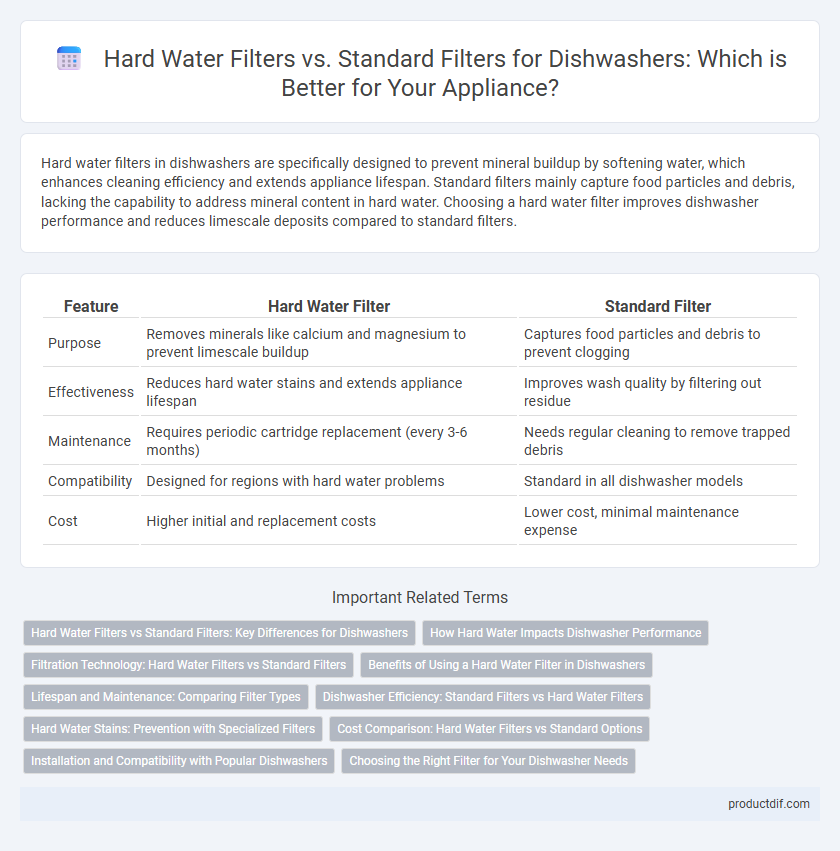Hard water filters in dishwashers are specifically designed to prevent mineral buildup by softening water, which enhances cleaning efficiency and extends appliance lifespan. Standard filters mainly capture food particles and debris, lacking the capability to address mineral content in hard water. Choosing a hard water filter improves dishwasher performance and reduces limescale deposits compared to standard filters.
Table of Comparison
| Feature | Hard Water Filter | Standard Filter |
|---|---|---|
| Purpose | Removes minerals like calcium and magnesium to prevent limescale buildup | Captures food particles and debris to prevent clogging |
| Effectiveness | Reduces hard water stains and extends appliance lifespan | Improves wash quality by filtering out residue |
| Maintenance | Requires periodic cartridge replacement (every 3-6 months) | Needs regular cleaning to remove trapped debris |
| Compatibility | Designed for regions with hard water problems | Standard in all dishwasher models |
| Cost | Higher initial and replacement costs | Lower cost, minimal maintenance expense |
Hard Water Filters vs Standard Filters: Key Differences for Dishwashers
Hard water filters for dishwashers use ion-exchange resin or specialized membranes to reduce minerals like calcium and magnesium, preventing scale buildup and improving appliance longevity, unlike standard filters that mainly trap food particles and debris. The effectiveness of hard water filters directly enhances washing performance by minimizing water spots and residue on dishes, a challenge standard filters cannot fully address. Selecting a hard water filter is essential in areas with high mineral content, as it protects internal components and ensures consistent cleaning results.
How Hard Water Impacts Dishwasher Performance
Hard water significantly reduces dishwasher efficiency by causing mineral deposits to accumulate on heating elements and spray jets, leading to poor cleaning performance and increased wear. Hard water filters prevent scale buildup by softening water, enhancing detergent effectiveness and prolonging appliance lifespan. Standard filters do not address mineral content, resulting in frequent maintenance issues and diminished dishwasher operation over time.
Filtration Technology: Hard Water Filters vs Standard Filters
Hard water filters in dishwashers utilize ion exchange technology to remove calcium and magnesium ions, preventing limescale buildup and enhancing cleaning efficiency. Standard filters primarily trap larger food particles and debris without altering water hardness, which can lead to mineral deposits over time. The advanced filtration technology of hard water filters extends appliance lifespan and improves dishwasher performance in areas with mineral-rich water.
Benefits of Using a Hard Water Filter in Dishwashers
Hard water filters in dishwashers prevent mineral buildup, extending appliance lifespan and maintaining optimal performance. They improve cleaning efficiency by reducing residue and spotting on dishes, ensuring a sparkling finish. Using a hard water filter also minimizes the need for frequent maintenance and costly repairs linked to limescale damage.
Lifespan and Maintenance: Comparing Filter Types
Hard water filters for dishwashers typically have a longer lifespan of up to 12 months compared to standard filters which often need replacement every 6 months due to mineral buildup. Maintenance for hard water filters involves regular descaling and cleaning to prevent clogging from calcium and magnesium deposits, ensuring optimal performance. Standard filters require more frequent manual cleaning to remove food debris and soap residue, impacting dishwasher efficiency over time.
Dishwasher Efficiency: Standard Filters vs Hard Water Filters
Hard water filters in dishwashers significantly improve cleaning efficiency by preventing mineral buildup that standard filters cannot address, resulting in cleaner dishes and reduced residue. Standard filters primarily trap food particles but lack the ability to soften water, leading to potential limescale deposits that decrease appliance performance over time. Using a hard water filter enhances dishwasher lifespan and performance by maintaining optimal water flow and reducing maintenance frequency.
Hard Water Stains: Prevention with Specialized Filters
Hard water filters in dishwashers specifically target mineral deposits like calcium and magnesium, effectively reducing hard water stains on dishes and glassware. Standard filters primarily capture large debris but lack the specialized media to neutralize mineral buildup. Utilizing a hard water filter extends the appliance's lifespan and maintains optimal cleaning performance by preventing scale accumulation inside the dishwasher.
Cost Comparison: Hard Water Filters vs Standard Options
Hard water filters for dishwashers typically incur higher initial costs, ranging from $50 to $150, compared to standard filters priced between $10 and $40. Long-term expenses for hard water filters can be offset by reduced appliance wear and less frequent repairs due to mineral buildup prevention. Standard filters often require more frequent replacement and may increase maintenance costs over time due to inefficiencies in handling hard water impacts.
Installation and Compatibility with Popular Dishwashers
A hard water filter for dishwashers typically requires a more specialized installation process, often involving direct connection to the water supply line and calibration for water hardness levels. Standard dishwasher filters are generally easier to install, designed as replaceable parts that fit universally with popular models such as Bosch, Whirlpool, and LG. Compatibility varies as hard water filters may not be supported by all dishwasher brands without specific adapters, whereas standard filters maintain broad compatibility across most major appliance manufacturers.
Choosing the Right Filter for Your Dishwasher Needs
Choosing the right filter for your dishwasher depends on your water quality and maintenance preferences. Hard water filters use ion exchange or special media to reduce minerals like calcium and magnesium, preventing scale buildup and extending appliance life. Standard filters primarily trap food particles but do not address water hardness, making hard water filters essential for households with mineral-heavy water to ensure optimal cleaning performance and protect internal components.
Hard water filter vs Standard filter (dishwasher) Infographic

 productdif.com
productdif.com